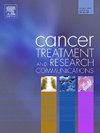细菌溶瘤治疗作为人类癌症治疗的新途径
Q3 Medicine
引用次数: 0
摘要
癌症是世界范围内导致死亡的主要原因。传统的癌症治疗方法,如化疗、放射治疗和免疫治疗,在治疗癌症时往往面临一定的局限性,如毒性、耐药性和对不同类型的癌症无效。因此,迫切需要替代治疗策略。一个令人感兴趣的新兴领域是细菌溶瘤治疗的使用。它利用细菌的自然特性来瞄准并摧毁癌细胞。天然和转基因细菌菌株都显示出靶向肿瘤缺氧区域的潜力,这些区域通常对常规治疗具有抗性。这些细菌还能产生治疗性分子,诱导癌细胞死亡。此外,它们可以刺激对肿瘤的免疫反应,使它们有助于开发癌症疫苗和利用抗肿瘤细菌代谢物。细菌溶瘤治疗的多功能性超越了直接靶向肿瘤。可与常规方法相结合,提高整体治疗效果。此外,细菌还可以作为抗癌药物的运载工具,确保更精确的靶向和减少副作用。不同的细菌属,如沙门氏菌、梭状芽胞杆菌、双歧杆菌和李斯特菌,已经显示出显著的抗癌潜力。本文旨在对细菌溶瘤治疗进行综述,探讨其与传统肿瘤治疗相结合的各种应用和潜力。本文章由计算机程序翻译,如有差异,请以英文原文为准。

Bacterial oncolytic therapy as a novel approach for cancer treatment in humans
Cancer is the leading cause of death worldwide. Conventional cancer therapies, such as chemotherapy, radiation therapy, and immunotherapy often face certain limitations in treating cancer, such as toxicity, resistance, and ineffectiveness against different cancer types. Therefore, there is an urgent need for alternative treatment strategies. One emerging area of interest is the use of bacterial oncolytic therapy. It employs the natural properties of bacteria to target and destroy cancer cells. Both natural and genetically modified bacterial strains have shown potential to target the hypoxic regions of tumors, which are often resistant to conventional treatments. These bacteria also produce therapeutic molecules that induce cancer cell death. Furthermore, they can stimulate immune responses against tumors, making them helpful in developing cancer vaccines and exploiting antitumor bacterial metabolites. The versatility of bacterial oncolytic therapy extends beyond direct tumor targeting. It can be combined with conventional methods to enhance overall treatment efficacy. Moreover, bacteria can also serve as delivery vehicles for anticancer drugs, ensuring more precise targeting and reduced side effects. Different bacterial genera, such as Salmonella, Clostridium, Bifidobacterium, and Listeria, have demonstrated significant anticancer potential. This review aims to provide a comprehensive overview of bacterial oncolytic therapy, exploring its various applications and potential in conjunction with traditional cancer treatments.
求助全文
通过发布文献求助,成功后即可免费获取论文全文。
去求助
来源期刊

Cancer treatment and research communications
Medicine-Oncology
CiteScore
4.30
自引率
0.00%
发文量
148
审稿时长
56 days
期刊介绍:
Cancer Treatment and Research Communications is an international peer-reviewed publication dedicated to providing comprehensive basic, translational, and clinical oncology research. The journal is devoted to articles on detection, diagnosis, prevention, policy, and treatment of cancer and provides a global forum for the nurturing and development of future generations of oncology scientists. Cancer Treatment and Research Communications publishes comprehensive reviews and original studies describing various aspects of basic through clinical research of all tumor types. The journal also accepts clinical studies in oncology, with an emphasis on prospective early phase clinical trials. Specific areas of interest include basic, translational, and clinical research and mechanistic approaches; cancer biology; molecular carcinogenesis; genetics and genomics; stem cell and developmental biology; immunology; molecular and cellular oncology; systems biology; drug sensitivity and resistance; gene and antisense therapy; pathology, markers, and prognostic indicators; chemoprevention strategies; multimodality therapy; cancer policy; and integration of various approaches. Our mission is to be the premier source of relevant information through promoting excellence in research and facilitating the timely translation of that science to health care and clinical practice.
 求助内容:
求助内容: 应助结果提醒方式:
应助结果提醒方式:


